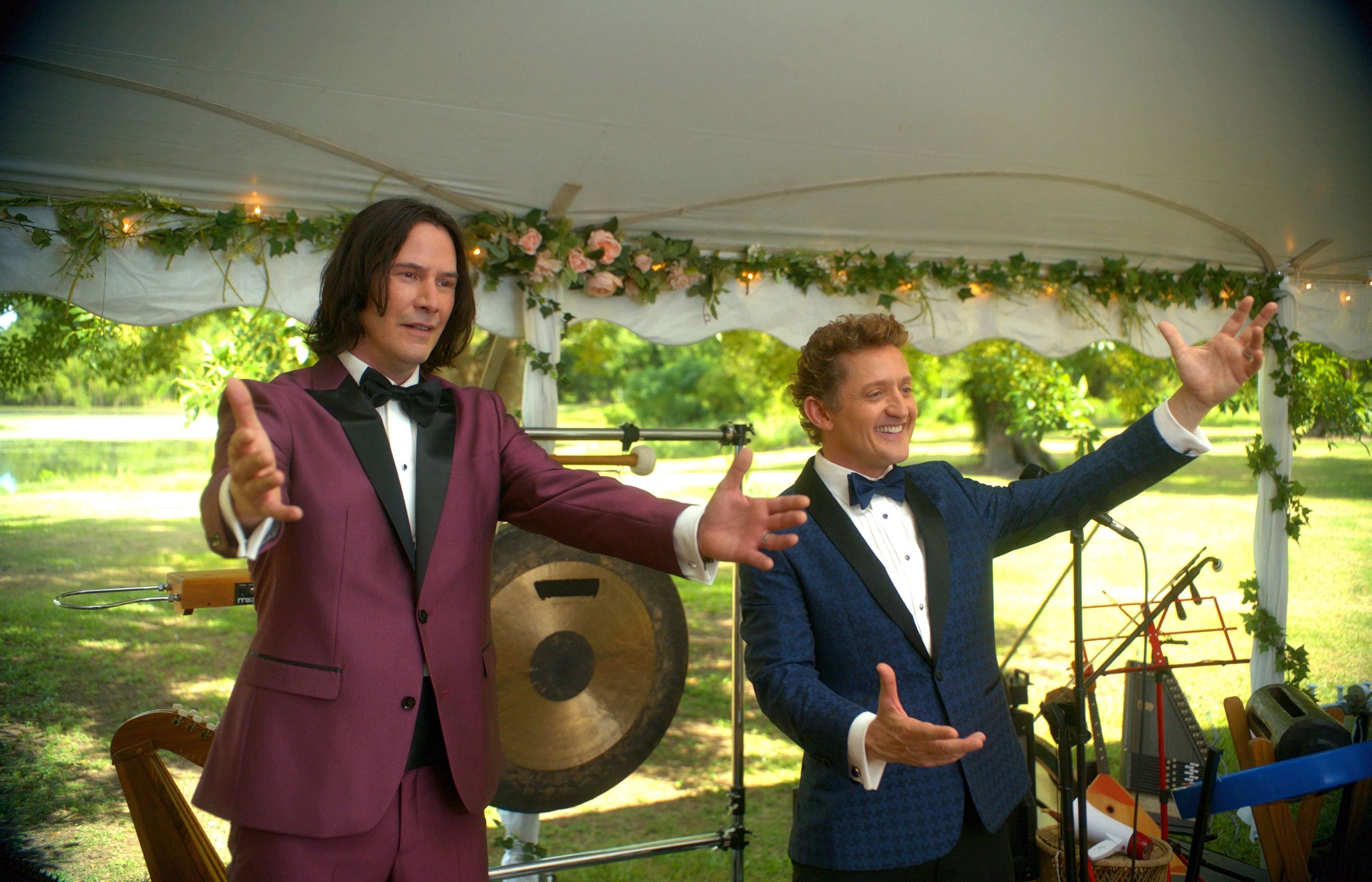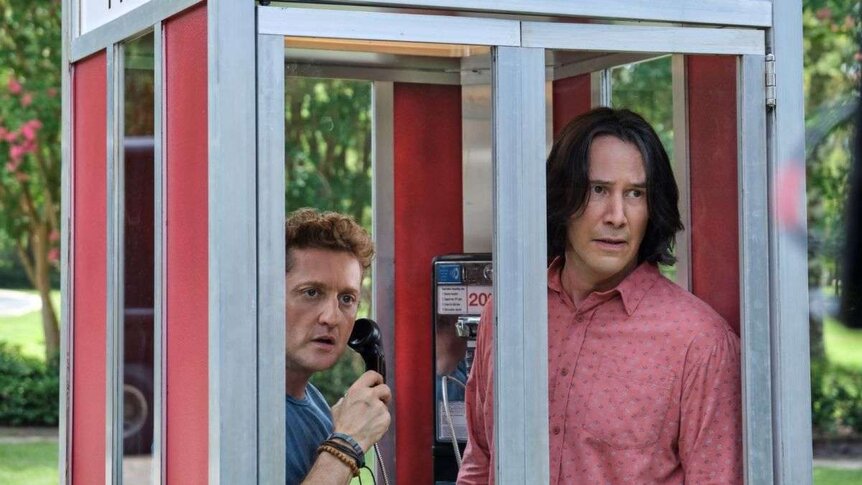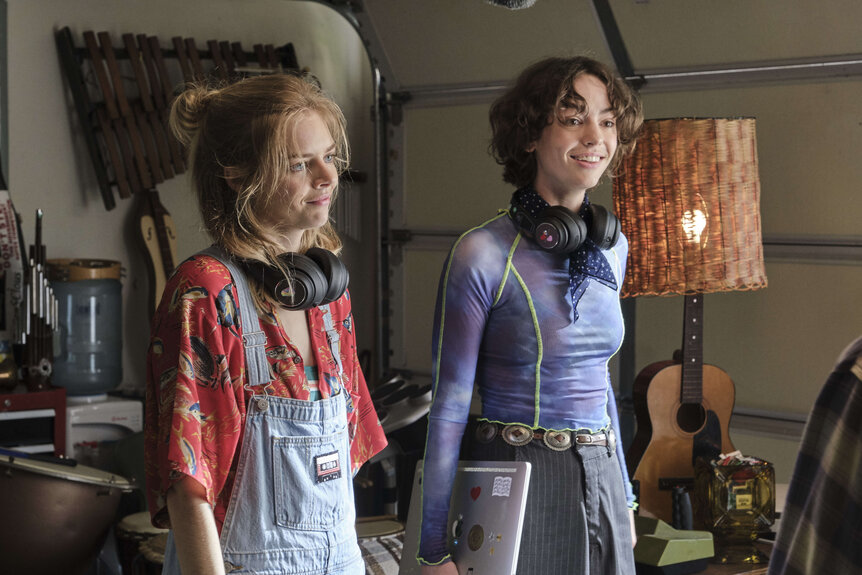Create a free profile to get unlimited access to exclusive videos, sweepstakes, and more!
Bill and Ted and the art of connecting through music

Spoilers for Bill & Ted Face the Music below.
When I was a younger woman, I had a friend who could sing opera. Her classically trained voice was as beautiful to me as it was intimidating. My own voice, which can be best described as "a tone-deaf alto with delusions of grandeur," felt shockingly inadequate in comparison. It made singing along to the radio on the way to Steak 'n Shake awkward.
One day, she finally just asked me why I always shut up whenever she started singing. I told her the truth. "Your voice is just so beautiful," I told her, "and mine... well!"
In response to my self-deprecation, she taught me about musicking.
The term "musicking" (or "to music") was coined by the New Zealand musicologist Christopher Small in the late '80s. To music, as Small defines in his 1998 book Musicking, is to, essentially, participate in music in any meaningful way. And I mean any. To sing, to dance, to compose, to set up equipment, and even just to listen: all of these activities count equally as musicking. Small is careful in Musicking to resist any notion of placing more value on one activity than another, to avoid gatekeeping and other shenanigans.
Because my friend's voice was objectively better than mine, I was too embarrassed to sing with her, even though I would never be held to the same standard. But the point of musicking is not to make the "best" sounds; the point of musicking to connect with someone through music.
Which is also exactly what Bill & Ted Face the Music argues, just with more jokes and time travel.
The Bill & Ted films never needed philosophical goals beyond mispronouncing Socrates and extolling us all to be excellent to one another. Is it not simply enough that Bill and Ted are two human golden retrievers doing the best they can by everyone they can? It is and I expected more of the same in the long-awaited third installment, Bill & Ted Face the Music.
What I did not expect was to find myself crying happy tears on my bedroom floor.
The first two installments of what is now a trilogy, Bill & Ted's Excellent Adventure and Bill & Ted's Bogus Journey, insinuate that Bill and Ted ultimately succeed in uniting the world by becoming such talented musicians that their music achieves global unity through its sheer excellence. Bill & Ted Face the Music, however, goes in a different direction. Wyld Stallyns has enjoyed both critical and commercial success since Bogus Journey, but the song has eluded Bill and Ted for decades. What they don't realize is that the song that will unite the world and save reality is not the greatest song ever written. As Ted's daughter Billie says at the end of the film, the song that unites the world is the song that everybody plays — i.e., the song that connects everyone.
Choosing connection over dissension is so thoroughly the film's raison d'être that I was honestly and pleasantly surprised. I knew, of course, that Bill and Ted's families would be so enmeshed as to constitute a singular family, heralded by their daughters' cries of "Dads!", and that they would need to patch things up with Death, who left Wyld Stallyns at the end of Bill & Ted's Bogus Journey. But I didn't expect to see Jo and Liz, who endeavor to have Bill and Ted recognize their marriages as individual relationships throughout the film, respond to Bill and Ted finally doing so with a sly "We know." And I was floored to see Chief Logan, Ted's father and the antagonist of Bill & Ted's Excellent Adventure, make a sincere and earnest apology to his son for everything he's done, promise to do better, and then do it.
(That's when I started crying.)
Bill & Ted Face the Music wears its musicking heart on its sleeve the most when it comes to their daughters, Billie and Thea. While Billie and Thea love music, they are not musicians (as they protest to their dads). But they do music: they listen, they curate, they produce. In short, they connect. Literally! They spend most of the film assembling a crack team of musicians by following an unbroken line of musical influence, from Hendrix to Ling Lun to Grom.
Before the film's release, many people guessed that Billie and Thea would ultimately prove to be the Preston and Logan of future prophecy. While I liked the idea of Bill and Ted handing off the baton to a new generation of human golden retrievers, I wasn't sold on Bill and Ted not performing the song they've been working towards longer than I've been alive. (Yes, I am aware they are fictional characters.) But Bill & Ted Face the Music splits the difference to include literally everyone. Billie and Thea produce, Jo and Liz run point on getting everyone instruments, and Bill and Ted play with the band to lead everyone in the song. For one moment, at 7:17PM on MP 46, the entire world is musicking its face off, raucously and joyously connecting.
As you may have noticed, we live in exceedingly dark times, where, on top of everything else, we cannot even congregate to connect with one another. I doubt I am alone in feeling like a raccoon caught in floodlights in the rare (and absolutely masked) moments I interact with someone outside of my household. Am I even good at connection anymore?
But, as Bill & Ted Face the Music tells us — being a feature-length explainer on musicking — that's the wrong way to look at it. I can't lose the ability to connect. It doesn't matter whether you're "good" or "bad" at something if the point is to connect.
Humans naturally music. We sing our babies to sleep, we sing while we work, we sing mean little songs under our breath at people on the street who just can't seem to figure out that masks go on your face.
...that last one might just be me.
But this is what my opera singing friend was trying to tell me, an unspecified amount of years ago. She did not sing around me to show off the beauty of her instrument and intimidate me into silence. She sang around me because she wanted to sing with me. She wanted to connect with me through music, and you don't need to be a great musician to do that. Heck, you don't even have to be a musician. Billie and Thea aren't. I'm certainly not, despite all efforts to the contrary. (I mentioned I'm tone-deaf, right?) When it comes to musicking, you just need to (metaphorically!) reach out and join in the song, whether it be through singing, dancing, setting up, producing, or listening with an open heart. In these harrowing times, I can't think of a better way to be excellent to each other.




























